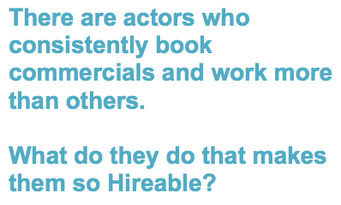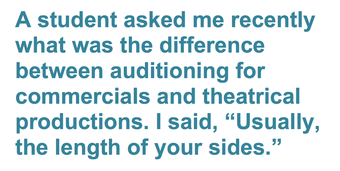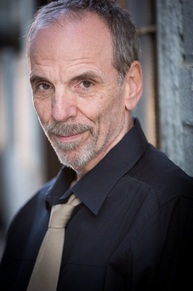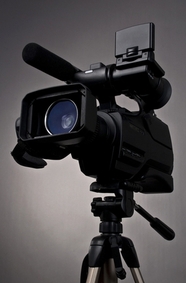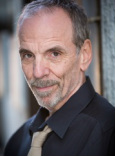As a working professional in acting, casting and teaching, I run up against a lot of misconceptions by actors I work with. Some of them are understandable, others are baffling in their lack of logic.
Viewing entries in
Doug Traer
We did it!
Keep It Real Acting is officially the 2015 BACKSTAGE READERS' CHOICE Winner for FAVORITE AUDITION TEACHER, FAVORITE IMPROV TRAINING CENTER, and FAVORITE KIDS ACTING CLASS! Below are our exclusive interviews with our Award Winning Teachers this year, Judy Kain, Paul Hungerford, Donna Rusch, Doug Traer & Nancy Linari! We hope these brief clips can give you a little insight as to what make these teachers so special.
Judy Kain is the owner of Keep it Real Acting and teaches the Commercial A to Z Class and the Advanced Callback Class. Judy has been a professional actress now for 37 years, showcasing her skills and talents in over 350 commercials and in over 80 roles for film and television.
Paul Hungerford teaches the Commercial A to Z Class and Improv-a-thon at KIRA. For over 25 years, Paul has been performing on stage and in film and television productions, as well as working with The Groundlings, Acme Comedy Theater, Impro Theater, and Comedy Sportz LA. He is currently the Director of TheatreSports at the Impro Theatre in LA, and has been seen on your TV set in over 40 commercials and a number of shows.
Doug Traer teaches the Kids Class & Commercial Wednesday Workouts at KIRA. Doug has been working in film, television, theatre, and commercials for the past 26 years. When he is not acting, he works as a commercial casting director and session director for many Casting Directors around town.
Donna Rusch teaches the Next Step class at KIRA. Donna has more than 20 years experience as a professional actress and broadcaster. She is a former TV News Anchor and Television Show Host and has been seen in more than 100 commercials and films, including last year's hit, Gone Girl.
Nancy Linari teaches the Teens Class at KIRA. Nancy has been a professional actress for over 30 years. Her work can be seen and heard in both commercials and animation, on television and radio; from Bones to Modern Family, from ABC’s animated The Addams Family (the sexy Morticia Addams) to the Academy Award nominated The Social Network (the cranky secretary to the president of Harvard.)
Again, We are overflowing with gratitude, humility, and love. Thank you so much for making KIRA a 2015, 3 Category Winner and a leading, competitive, loved acting studio in LA!
Sincerely,
Your KIRA Family
At first, I told him that if he figured it out, please let me know. No one knows of one thing or combination of things that will always get you booked.
But, he said, there are actors who consistently book commercials and work more than others. What do they do that makes them so hireable?
I had to think about that one.
It’s true, I know a handful of actors of different descriptions who book a lot of commercials and they have some traits in common.
1. They are a “type.” Americans relate to people they can recognize and categorize in their minds. We call them “types.” By their looks and what we see on TV, we expect a certain behavior from them. For instance, blue collar types are usually lovable, not that smart, hardworking and honest. You’ll see them in family restaurant and truck commercials. Slacker types are unshaven, often college students or stoners, have messy hair and clothes, and are generally irresponsible. They populate nearly every beer commercial and some computer as well as fast food spots. Because commercials are only 30 seconds long, types must be instantly recognizable. These actors have that quality.
2. They are good actors. Yes, commercials generally aren’t as demanding of acting skills as theatrical productions. But good acting is good acting, and just as if I were going to have minor surgery somewhere, I would want an overqualified surgeon to perform it, directors want an actor who is capable of much more than just the role you’ve hired them for.
4. They are not thrown by change. They can roll with whatever changes are made, and shift gears without batting an eye. Often in callbacks, I see directors ask for a different interpretation of a script. Not because they think it will be shot that way, but just to see if the actor can do it. Usually these actors have a background in improv.
5. They are confident. They know they can do they job and they project that confidence to the agency and production company. They are not intimidated by the process. Think about it. If I were going to have the above mentioned surgery, do I want a surgeon who behaves as if they’re not really sure this is a good idea or can be done? Or do I want someone who is on board with the diagnosis and makes me believe that it’s a piece of cake?
6. They get it. Oftentimes I see actors come in and give an audition without understanding the spot. If it’s comedy, they don’t know why it’s funny. Actors who book get it. They watch commercials and know the tone of the advertiser and commercials in general. And if they don’t understand, they ask to have it explained.
7. They are consistent. If you call them in, they will consistently give a good, believable performance. And they tend to be level headed, neither blinded by success nor defeated by failure. They know the game and they know how to play it.
Most of the things I’ve described come from training and experience. Okay, that’s not true of your looks, sex or ethnicity, but training and experience should dictate the audition choices you make. You can learn a lot taking classes and just watching commercials. Watch the performances. Note the economy of words and images. Watch how they’re edited. See how different companies have their own style or message regardless of the spot. Then remember that when you audition for their ads.

Doug has been working in film, television, theatre, and commercials for the past 26 years. His film credits include Robert Miller’s Brenda Starr, the critically acclaimed Speak of the Devil and the black comedy Dead Giveaway. He has had multiple roles on General Hospital, appeared in America’s Most Wanted and Saved by the Bell, among others.
He has made a number of national TV commercials for products such as Mercedes-Benz, Sony Playstation, Sprint, Blue Cross Insurance, Baskin Robbins Ice Cream and Hardee’s Restaurants.
In addition to his acting gigs, he works as a commercial casting director and session director as well as teaching and providing career guidance to young actors or those just getting into the business. He also directs theatrical and industrial video productions through his own independent production company.
Doug studied acting with master teacher Cliff Osmond for 15 years and improv with the LA Connection. He began teaching commercial classes 12 years ago and theatrical classes in 2003. He has also taught in San Francisco, Chicago, Oakland, Phoenix and Santa Barbara and recently returned from Tokyo where he taught American acting to Japanese students.
A few years ago, a friend of mine I will call Ted approached me about getting into commercials. I was somewhat surprised, since he had previously told me that he was a “serious” actor, and would not even consider doing commercials. Which was too bad because he had a great look.
I referred him to a commercial agency that signed him, and soon he was on the audition trail. He was in on several sessions I directed, so I was able to see his work.
After a few months, he came to see me, asking why I thought he wasn’t booking spots. “I don’t get it,” he said, “I’m not even getting callbacks.” “What do you do to prepare for your auditions?” I asked. “Prepare?” Ted said, incredulously, “For a commercial audition?” “What kind of training have you gotten?” I asked. “Training? For commercials?” he responded.
I knew what his problem was from watching his auditions. He still believed himself too good to act in commercials, and so didn’t take the audition process seriously. He did not treat his commercial auditions with the same respect he had for theatrical auditions. Consequently, he was always “on top of the material,” not creating a reality around the audition situation. So his auditions came off as arrogant and aloof.
A student asked me recently what was the difference between auditioning for commercials and theatrical productions. I said “Usually, the length of your sides.”
True, there is more technique involved in commercial auditions, eg: cheating to the camera, inventing a button, etc. But both come down to good acting—creating a credible character that an audience can relate to.
Of course, commercial actors should always be aware of the style of the product’s advertising. For instance, you don’t audition the same way for McDonald’s as for Bud Light. But the same is true in theatrical. You wouldn’t audition for “Sons of Anarchy” the same way as for “Modern Family.” The biggest difference is that with commercials, the hardest part is actually the audition. Once you’ve booked the spot, everything else is easy. Whereas for theatrical, once you’ve booked the role, your work has just begun.
Another thing to consider when thinking about commercial auditions is that there are a lot of very good actors out there booking commercials. They know what they’re doing and how to audition well. They are your competition. Every time you audition you are going up against them and they take it seriously.
Remember, you’re an actor and auditions are precious. Honor your craft by giving them the attention necessary to make them credible.
In addition to his acting gigs, he works as a commercial casting director and session director as well as teaching and providing career guidance to young actors or those just getting into the business. He also directs theatrical and industrial video productions through his own independent production company.
Doug studied acting with master teacher Cliff Osmond for 15 years and improv with the LA Connection. He began teaching commercial classes 12 years ago and theatrical classes in 2003. He has also taught in San Francisco, Chicago, Oakland, Phoenix and Santa Barbara and recently returned from Tokyo where he taught American acting to Japanese students.
But just as there are different types of roles, there are different types of auditions. Reading for theatre, for instance, usually involves auditioning in the theatre for the casting director, director, producers, etc. Because it’s theatre, you would reasonably be expected to know to play to the house, meaning your vocalizations and gestures would be a little bigger, so the last row of the audience could see your work.
But commercial auditions are virtually always on camera, as are some TV auditions nowadays. As actors, we need to be aware of how that should affect our performances. Surprisingly, I find that most commercial actors do not take that into account, and their audition suffers.
When auditioning for the camera, think of it as the audience. As in theatre auditions, you play to that audience. Because the camera and microphone are closer, you won’t need to project or gesture grandly to be seen or heard. A zoom lens can move the audience within inches of your face, so your acting can be more natural and subtle.

So how to compensate for these problems? There are a number of simple tricks that will maximize your audition potential. First, take the room into account. Where is the camera? The microphone? Where does the lighting end? The mark on the floor will usually tell you not only where to stand, but how to orient yourself to the camera.
Now that you know where it is, play to the camera. This means that while in life, you might look directly at the person you are talking to, on camera that isn’t necessarily so. Because if you do and the other actor is on the same plane as you, we see you in profile only. So I direct actors to “cheat out,” meaning play their lines and reactions where the camera can see them 3⁄4 faced. When you look at the other actor, your upstage eye should focus on their downstage eye, which opens you out. And always remember, you don’t have to be looking at someone to hear them or be heard by them.
Another way of doing this is to give yourself a point of focus out near the camera. For instance, if you are talking about a car, put the car in the cue card, or under the camera.
Notice the height of the camera. If it is above your chin, raise your chin just slightly to compensate. If it is below your chin, lower your chin accordingly. That way, we don’t get a shot that features a look up your nose or one that magnifies your forehead. Ladies, if you have a part in your hair on one side, try to use the side that favors the part, not the side with the most hair. If you must use that side, be sure to put your hair behind your ear or tie it back and cheat out.
Ask the director what your frame is and you can better gauge the size of your performance. For instance, if you are being shot in a closeup, actions and expressions can be smaller and the camera will still get them. Whereas looser shots will give you a bit more freedom.
Look at the lighting. Where does it end? Stay within that pool of light. Don’t come too close to the camera and be sure you are not saying your lines off camera. A good rule of thumb is to not begin speaking until your have hit your mark.
You can practice these techniques at home with a video camera of any kind. Even a cell phone camera will work. Set it up, get some commercial copy and become accustomed to playing out to that camera. Then review your work. See what works and what doesn’t. Then put what you learn into practice and see the difference.

In today’s commercial production world, things happen quickly. When a casting director puts out a breakdown, they can get 1500 to 3000 submissions for a single part. The production company may have only given them one day to cast that part. Think about that: let’s say the part has dialogue—perhaps 3 or 4 lines and some action.
The actor steps in the room, the session director explains the audition and directs the actor in what is expected of him or her. If it is complicated, perhaps the actor requires a rehearsal. Then redirect. First performance is recorded, another redirect and a second performance recorded. Assuming none of the recordings are stopped and restarted for flubs, the entire process will take maybe 6-7 minutes.
Under ideal circumstances, the casting director can schedule 10 actors per hour to audition. In an 8 hour day, that’s 80 actors. 80…out of 3000 submitted. Which means about 2.5% of actors submitted got an audition. That’s pretty lousy odds, which makes those chances, those opportunities to book a paying gig, even more precious.
So when I see actors wasting them by not showing up or coming in late or early or not wearing the right clothes or not looking at copy posted for them online, I am understandably frustrated. Not just because they have squandered an opportunity, but because they are behaving unprofessionally—they are dishonoring the profession I love.
What would happen if a plumber or surgeon did the same? The plumber who showed up for a job without his tools or dressed in tennis attire would soon lose his job. A surgeon who reported for duty in a golf outfit with no knowledge of the patient he was working on would be laughed out of medicine.
So what should you do? Let me sum it up in two simple words: BE PROFESSIONAL! When you get an audition from your agent you want to find out the following information:
1) What is the product?
2) Who is the casting director and where is the audition?
3) When is the audition?
4) What is my character? Does he have lines? If so,
5) Are there scripts available?
6) Am I expected to appear in costume or makeup?
If you are really thorough you will ask who is the director, what is the union status, the run on the spot and what conflicts are held.
Then get to the audition 15 minutes before your time so you are able to relax and study your script. Have a headshot with you, even if you think you won’t need it. Use your waiting time wisely preparing for your audition.
In short, treat it like it is important to your life and career—because it is!
Doug Teaches Commercial Wednesday Workouts at Keep it Real Acting Studios.
